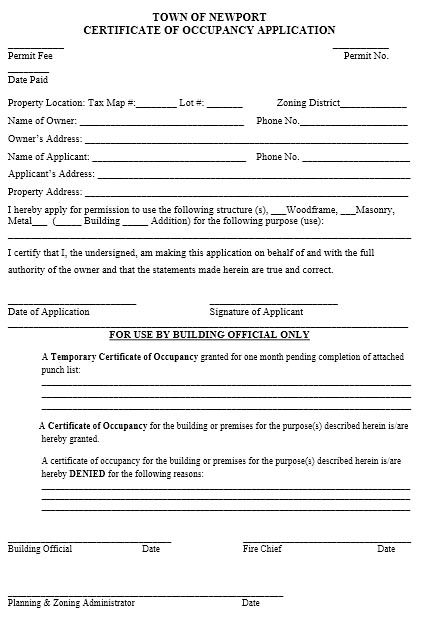Certificate Of Occupancy | What Is It?
Certificate Of Occupancy
The final step in the permitting process for new construction is typically the Certificate Of Occupancy. The Certificate Of Occupancy (CO) is issued by the local or state government certifying that the building structure complies with current building codes and is suitable for occupancy.
The CO is typically issued after a final inspection of the property. The inspection focuses on applicable building code provisions and any local zoning provisions or ordinances. CO’s are sometimes issued as “Temporary” when there is significant enough progress to allow the space to be lived in, but enough items unresolved that further inspection is required. Often times this relief helps owners finalize construction loans and begin the process of moving into a new or newly renovated space.
Typical Certificate of Occupancy Inspection
Certificate Of Occupancy procedures vary from town to town but typically involve  inspections of life safety, heating and ventilation, running water and sewer and safe working electric power. Some typical inspections that might take place include:
inspections of life safety, heating and ventilation, running water and sewer and safe working electric power. Some typical inspections that might take place include:
- Life Safety – Proper means of egress, correct stair geometry including railings, properly functioning smoke detectors and 911 address signage for emergency responders.
- Heating & Ventilation – Inspection of heating equipment and proper ventilation for bathrooms.
- Water & Sewer – Inspection of water and sewer services including functioning toilets and sinks along hot water of sufficient heat.
- Electric Power – Safe working electrical service including proper installation of ground fault circuits, arc fault circuits and properly sized circuit breakers.
It is not uncommon to have more than one inspection. Typically there will end up being a list of items that need correcting in order to receive the final Certificate Of Occupancy. Most inspectors will issue a Temporary Certificate Of Occupancy if the remaining issues are minor in nature. This allows home owners to move into the house while the remaining list of items is being corrected.
Certificates Of Occupancy are often times required by financial institutions before they release final construction loan payments or allow a home owner to close on a new house. Those kind of requirements actually benefit all parties, it pushes the builder to complete all remaining items so that the owner can get the money to pay them. The CO also provides reassurance to the owner that the new house complies with building codes and is fit for occupancy.
So if you’re building a new home be sure that you get your Certificate Of Occupancy.














I wish to remove an existing wall between my living room and kitchen. Does this affect the certificate of occupancy?
Has nothing to do with the CO, but you should be very careful and determine if that wall is a bearing wall prior to removing it.
I am interested in buying up to six homes all located on one street. Is there a such thing as getting funding assistance from the city on a project like this to assist with the cost of updating a neighborhood near a downtown area?
would my builder consider me moving in early occupancy before one month before closing? Our apartment lease ends in July 21st and they don’t do month to month.. is this something that is feasible with builders?
Best you can do is ask…..it will certainly slow them down.
I’d like to know how to reduce the exorbitant market up costs by developers constructing new homes for active seniors that could easily and more economically be performed later by independent practicing artisans once the new homeowner receives a certificate of occupancy by the local building department, thereby, lowering one’s property taxes ultimately.
Not entirely sure what you’re suggesting. As a developer myself, I can tell you profit margins on new homes isn’t what you think. Here where I’m at if we make 7-10% we’ve done a great job. Typically it ends up less than that.
Once i have a COO, specifically what are the next steps and how soon could I be in my house?
You can move in immediately
On a new home build, does the builder get the certificate of occupancy or does the homeowner?
The builder…owner pays any fees
we have been thru a nightmare with our builder. the supervisor didnt supervise and when he occasionally showed up he never inspected the subs work I was there everyday taking pictures and e mailing the mistakes we went weeks sometimes supervisor never even came by. we just had final inspection and Cof o is issued. the building inspector says we can move in right away but the builder says we owe him invoices I have e mailed numerouse times and asked about our credits that we were supposed to get for items we provided and no one responds they ordered the wrong sliding door it was supposed to have blinds inside the door but i advised them when it delivered they were wrong they installed it anyway and then had to take them out and put in the right ones and want to charge me $1200 which i told them Why should i pay for your mistake and they went 2 months past their contract date when it clearly stated time is of the essence! which cost us to pay rent on top of construction loans so bottom line is cert of occupancy is approved can we move in the house before the final finances are settled
New build. To get a CO, does everything have to be complete? Specifically, baseboards, doors, interior paint, flooring. My husband is retired and wants to do these things himself. He is actually very handy! Just wondering if those are things that have to be completed before moving in.
Thanks!
We are building a new house and our son is the general contractor. Will a mortgage company allow us to move in prior to our closing? We are waiting for closing do to some cash we have coming so our mortgage payment won’t be so high.
I closed a loan on a new home in 2002. Didn’t find out until 15 years later we never received a Certificate of Occupancy. And our long form HUD 1 documents 15pages with initialing 4 pages are missing our initials. 2 pages are concerning borrowers’ insurance, the other 2 are for the selling and sevicing of our loan which the bank sold the servicing to another bank within the first 3 years, 2005. And a couple other serious concerns. Our understanding after 22 years in court, We have never had a mortgage??? and no occupancy permit, the bank owes us all the money back we spent on the house over the past 22 years because its never legally been ours??? Jsut asking those 2 questions. Thank you in advance.
The CO really has NOTHING to do with ownership. It’s just a document saying that the house meets code to live in. Your bank owes you nothing at all.